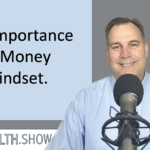In today’s post, I want to try to answer the question, what is True Wealth?
This is the True Wealth Financial show site. The name of my advisory firm is the True Wealth Financial Group.
Thus, it would be helpful to know what is True Wealth?
First Heard the Term
Honestly, the first time I heard this was around 2013. I was, at the time, the financial counselor at the CIA, the Central Intelligence Agency. I had been coaching for a couple of years, and I got invited by LPL, which is a big independent broker dealer in the United States to a conference there by a recruiter that Ron Carson was hosting. Ron Carson owns a wealth management organization in Omaha, Nebraska.
At the time, he was LPL’s biggest advisor. They were really using him for recruiting, and he was building a coaching platform. So they were, partnering together to help bring in business as well as help people get into his coaching program named EXCEL. I went to this conference, in Virginia, around the McLean area at a Marriott, just off the beltway. During that presentation, he mentioned something about the idea of true wealth. At the time, the way he described it was, “the things that money can’t buy and death can’t take away.” It just kind of struck me at the moment of this term True Wealth.
What it is Not
And so let me first tell you what it’s not. If you think about get rich quick schemes or complicated financial systems, it’s not really about that. It’s really not even about money per se.
If you just think of the term “wealth” in contrast to “rich” in some degree, they’re synonyms. But there’s slight differences. When I think of the word “wealth”, I think of more holistic in nature, long lasting, and more established. When I think of someone who’s wealthy, I think of someone who has good character, is grounded, and has wealth beyond just, “I won the lottery” or “I got rich quick because I signed a contract deal”
When you think of the word “rich” there’s a lot of money involved with riches, but really that’s the focus of – money. When I think of someone who’s wealthy, I think of, someone who’s legacy minded, who’s stewardship minded, things like that. So that’s the wealth side of it.
If you think of the word “true”, it contrasts with “fake”. Something that is true is something that’s real. It’s grounded in truth. It’s founded in principle.
Whereas something that’s fake ss, is not real. It’s an illusion, a mirage. Someone who has put on a fake perspective of being wealthy or being rich, who is not – is not what we’re striving for.
A lot of times people will use debt. This guy will finance a car and then drive up to a stop sign or a red light, and have this countenance of “yeah, I’m the man because I’m driving this car”. But in reality, they don’t even own the car. It’s financed and they have payments. The banker is the real owner of the car. They’re just renting it to him for a little while, and he’s drawing his identity from it. There is this fakeness of a material thing that he doesn’t even really own, that makes him feel rich.
A Wise Steward in Luke 16
As we explore what is True Wealth, the other thing that came to mind is it’s not really a thing at all, but more of an approach. An approach to handling money. One time I was reading through my Bible and I got to Luke 16, and I read this verse, verse 11, it says, “If therefore ye have not been faithful in the unrighteous mammon [which is money], who will commit to your trust the true riches?”
I’ll summarize Luke 16 to some degree, because it gives us the principles that reinforce this approach to money. In Luke 16 Christ is teaching his disciples, using this parable of a Lord and a steward. A steward is the idea of someone who manages the household for someone else. You could think of them as a butler, as a maid, as a manager.
We still see this on ships with the steward of a ship handles people’s bags and all the arrangements of the guests and things like that. In Luke 16, this lord accuses his steward of not managing things well, essentially being wasteful and not doing a very good job. And he comes to him and says, you might not keep this position. Basically, I might fire you from this position. The steward says, “oh, no, what am I going to do? I don’t really have any other kind of skills and I don’t want to go beg.” He begins to go out to all the different people who owe his lord some money, and basically says, “Hey, how much do you owe?” Then when they answer, And he says, “Hey, I’ll give you a discount.”
You owe a hundred dollars, just make it 80. How much wheat do you owe? a hundred bushels. Well just go ahead and make it 50. And the Lord comes to the steward and commends him for, for doing a good job, for being wise, for going out, establishing some relationships and working with all these people.
Now, the steward did, it, for his own personal gain. He was hoping that if he got put out of his stewardship position, that these people would receive him. And in the passage there, it talks about how, the people are, wiser than the children of light when it comes to money. It continues to say, “He that is faithful in that which is least is faithful also in much: and he that is unjust in the least is unjust also in much.”
Then it goes into that verse 11, again, “If therefore ye have not been faithful in the unrighteous mammon, who will commit to your trust the true riches?” Christ ends it with, “you can’t serve two masters”. You’ll love the one and hate the other. You can’t basically serve God and mammon.
Throughout this story is highlighted a handful of principles that to me resonate with true wealth. Number one is the idea of stewardship, that you are managing this wealth, the money that you have, the resources, the capital that you have are for a greater good or, or for something else, some external purposes, not just yourself.
Number two is that there are relationships are involved. There’s a handful of relationships involved with money. Your relationship your employer. If you own a business with your customers and your vendors. If you’re married, the relationship with your spouse or with your children, friends and family. Money is intertwined with every relationship we have because money is involved in the transactional or aspects of our relationships.
Thirdly, the Lord commends the steward for being wise. And thus, true wealth, involves applying wisdom to how we’re handling money.
Additionally, he talks about the idea of faithfulness. So true wealth is connected with the idea of being faithful and handling our money. Being honest, having integrity, doing the right thing, having character, full of hope. Hope that we will have a better future. That’s what faith is. Being full of it, goes along with the understanding that it’s something more valuable than money. That passage in verse 11 says, “If therefore ye have not been faithful in the unrighteous mammon, who will commit to your trust the true riches?”
It teaches, that there is something worth more than just money. Money is valuable, but there’s something that’s more valuable than that. It’s the idea of not making money the sole focus of your life. You can’t serve two masters.
I think of money as a tool. It’s a mechanism. It’s something that we use to interact with people, but it’s more than just that.
It talks about the end of the passage of being content, not being covetousness and being driven by that. So, this helps illustrate that there’s an approach and principles associated with wealth. The idea that there’s more meaning and purpose to having true wealth in comparison to just the actual money itself.
My Definition of True Wealth
The first definition of true wealth, is that it’s not fake and it’s not just about the money. Secondly, we realize that there’s principles, approaches and means to handling money. These two things really culminate to what my definition of true wealth is.
I define true wealth is the valuable things in life that money can’t buy, the valuable things in life that money can’t buy.
Now, money enables it for sure. But you can’t buy it.
What are some examples? Obviously, something for me as a Christian is salvation. You’re not redeemed with silver and gold.
Peace is another example. Zig Ziglar said “you could buy a good bed, but you can’t buy a good night’s sleep.”
Confidence in your financial future, in your life is another. Making memories from the experiences that you have, hope that your financial future and your life will be better are other examples.
Unity – You can’t buy unity. Unity with your spouse, unity with your kids, unity with your vendors, or with your employer. Unity with yourself!
Another example would be purpose and legacy. When someone dies, or you die, what do you want them to remember and think of when they think of you. That’s something that you can’t buy, but it is valuable.
Money is an Underlying Enabler of True Wealth
But the reality is, that money enables all of these things. Shakespeare said a man with a toothache cannot be in love. The idea is that all he’s thinking about is this painful tooth. And if you’ve had really a bad tooth experience, you know it can be extremely painful. And so, you’re not thinking about anything but the tooth.
And the same thing is true with money. When you’re struggling or stressed or anxious about money, because you don’t have a clear plan, you don’t have a clear future, you don’t have a clear next step, things like that, your financial future is uncertain to you. That’s all you’re going to think about.
That then distracts from these really valuable things in life. Things like unity, peace, confidence, purpose, legacy, memories. You can’t focus on those things because you’re only stressed out about the money. The idea is that the more you get your money under control, the more you’ll get your life under control. Therefore money enables True Wealth.
In Conclusion
I define True wealth as the valuable things in life that money can’t buy. But it is certainly enabled by finances. I hope that is helpful for you. It gives you a little bit of insight as to my thoughts, approaches and kind of philosophy with money, with wealth, with true wealth specifically.
If you have any questions, please feel free to ask. I’ll be glad to answer them, to the best of my ability.
I hope this is helpful for you. And until next time, I hope you have a great day.



Pingback: The Importance of Money Mindset - TrueWealth.Show